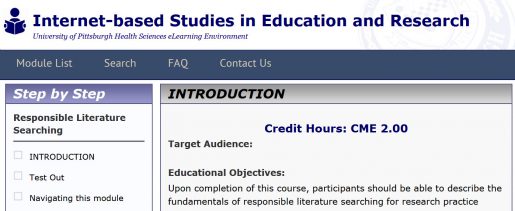With the help of Google, we’re used to getting the search results we want right away. It’s easy to parse whether a search engine has given you what you need if you’re looking for a quick dinner recipe or Pitt’s current academic calendar. However, searching for biomedical literature isn’t as easy, and incorrect search terms, incomplete searches, or using the wrong database could lead to inadequate results. That matters a lot, especially when designing studies involving human subjects. With an ever-increasing amount of biomedical literature and so many ways to find it, how can researchers be sure they aren’t missing anything?
HSLS is here to help! We have released an updated version of the Responsible Literature Searching module for clinicians, scientists, and anyone looking to improve their biomedical literature searching skills. The module provides guidelines to follow in order to search the literature in a responsible manner, especially when working with human subjects.
Responsible Literature Searching guides researchers through topics to consider when searching the literature, including:
- Boolean logic
- resources available at HSLS
- the differences between (and importance of) primary, secondary, and tertiary literature
- how HSLS librarians can help
This module can help researchers feel confident in their searching abilities whether they are just starting out or are well into their career.
Access the module through Pitt’s Internet-based Studies in Education and Research page.
This module was developed by the Health Sciences Library System (HSLS) with support from a contract granted through a cooperative agreement between the Association of American Medical Colleges (AAMC) and the Office of Research Integrity (ORI) of the U.S. Department of Health and Human Services. HSLS’s application was sponsored by the Association of Academic Health Sciences Libraries (AAHSL).
~Rebekah Miller
